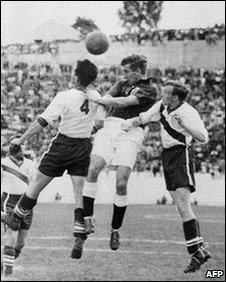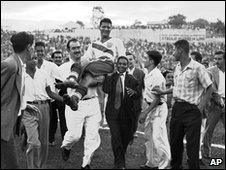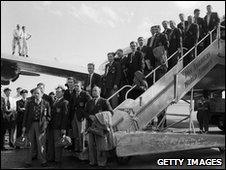World Cup: US v England match recalls 1950 upset
- Published
As England and the US prepare to meet on 12 June for their first game of the World Cup in South Africa, the BBC's Kevin Connolly reflects on the two sides' last World Cup encounter, in 1950.

The US side was made up of amateur and semi-professional players
It is still the sporting surprise against which all other sporting surprises should be measured.
On the world's greatest stage, a team of amateur and semi-professional footballers from the United States beat the footballing aristocrats of England.
You need to think in terms of a British college baseball team beating the New York Yankees or a pub cricket team triumphing over the Australian test cricket side to get a feel for what it meant back then.
The US line-up included a postman, a mill-worker and, appropriately enough from England's point of view, a funeral director.
One or two of their players were not able to make the trip to host country Brazil because they couldn't get time off work.
The English Football Association (FA) had never even bothered to enter the previous World Cup competitions - England had invented football and if various bunches of foreigners wanted to amuse themselves by pretending they were world champions, they were welcome to.
Everyone knew that England was the best team in the world.
And the 1950 squad was pretty good too; assembled at the airport for the newsreel cameras they looked confident and relaxed - perhaps not surprising when you consider that most of their fellow countrymen assumed they were heading for Brazil to collect the cup rather than to compete for it.
There was the captain, Billy Wright, who delivered a modest but confident speech about trying to bring the cup home, and available to him some of the greatest players in English history - Stan Mortensen, Stanley Matthews and Tom Finney among them.
War veterans
The World Cup in 1950 was not the global event we will see at South Africa 2010.
It was a splash of colour in the drab austerity of the post-World War II world but anywhere outside Brazil it seemed hopelessly remote.
Some of the teams that qualified - like India - withdrew because of the expense of travelling such a long way to play and others economised by sailing, rather than flying, to the tournament.
It was so far from Europe that radio coverage was patchy at best and most fans would see only a couple of minutes of newsreel film of the games, often days after they had been played.
The English and American teams had one thing in common - in their ranks were tough young men who had lost the best years of their playing careers to the war.
Stan Mortensen and Wilf Mannion were among those who had seen combat on the English side; among the Americans, Frank Borghi and Frank "Pee Wee" Wallace were decorated veterans.
They differed from the cosseted stars of the modern game in other respects too.
The England stars earned more, but not much more, than the fans who paid to see them every week and the American team were on a budget so tight they could not be sure until the last minute that they would be getting new kits for the tournament.
I travelled to rural Pennsylvania last month to meet Walter Bahr, one of the last survivors of a game which remains a source of pride to American soccer fans and a source of abiding irritation to English football.
Walter and his team knew England were favourites, of course.
"Our goal was probably to keep the score respectable," he told me. "We knew they were better prepared, coached, managed and in better condition.
"We were going in as complete underdogs. I don't think any of us went in there thinking we had a chance of winning."

Joe Gaetjens, a Haitian-born American, scored the winning goal for the US side
The essential story of the game isn't really disputed. England dominated possession, hit the woodwork and might have had a penalty but on the counter-attack the Haitian-born American Joe Gaetjens deflected a long range shot from Walter Bahr past Bert Williams and into the English net.
In a newspaper cutting, Walter and I found a quote from Williams which implies a rather grudging English reaction even after all these years.
The Americans, said the England 'keeper, turned up wearing sombreros and smoking cigars and only touched the ball six times in the whole game.
Walter, who has a gently amusing manner these days, had a simple response. "To win 1-0," he pointed out, "you only need to touch it once."
Walter is a competitor to his fingertips. He spent his life as a soccer coach, his two sons became NFL stars (and each won two Superbowl rings) and his grandson, Dieter, has the potential to make it as a soccer player.
He is looking forward to the rematch between England and the US and, while he concedes that England will once again be favourites, he warns that if he were an England fan he "wouldn't want to play the United States", which these days is a tactically-sound, technically-proficient professional unit.
He offers this thought too. "I'm going to rub one thing in though and I never even thought of this.
"It's taken England 60 years to have the opportunity to tie up this series in World Cup finals play. We've led them 1-0 for 60 years."
Invention
The 1950 game is a part of sporting history now - and urban myths swirl around the memories.

England's failure to win in Brazil was a blow to the nation's sporting ego
You may have heard that some English newspapers reported the result as 10-1 to England because they assumed there was some sort of typing error on the wire services when they reported it was 1-0 to the US. As far as we can discover, that's just not true.
And the story that the following day's English newspapers appeared with black edges like funeral cards also appears to be an invention.
Not many games can claim to make a lasting impact, but England played in blue shirts that day in the mining town of Belo Horizonte - and after the defeat they never played in blue again, the tale goes. (In fact, England played once more in royal blue in Peru in 1959, a friendly the English lost 4-1.)
The game made an impact on American popular culture too - a movie about five years ago celebrates it as The Game of Their Lives.
But the film is curiously wooden and cliched. Walter doesn't like it much, although if you're English you might be amused by the way in which players like the modest Mortensen - a working-class Geordie - are portrayed as sneering toffs.
Football's lesson
If you're a football fan from anywhere except England or the US you will probably remember the World Cup of 1950 for the final between the favourites Brazil and Uruguay, which was played before the biggest sporting crowd of all time - 199,954 fans crowded into the Maracana stadium.
Those who were there in Rio de Janeiro remembered it for the eerie silence that descended as it became clear that Uruguay were going to have the temerity to win.
But if you are English or American, then the lesson you take away will be different - it is that anything can happen in football.
As England once again prepare to take the field as favourites against the United States, it is a lesson worth remembering.